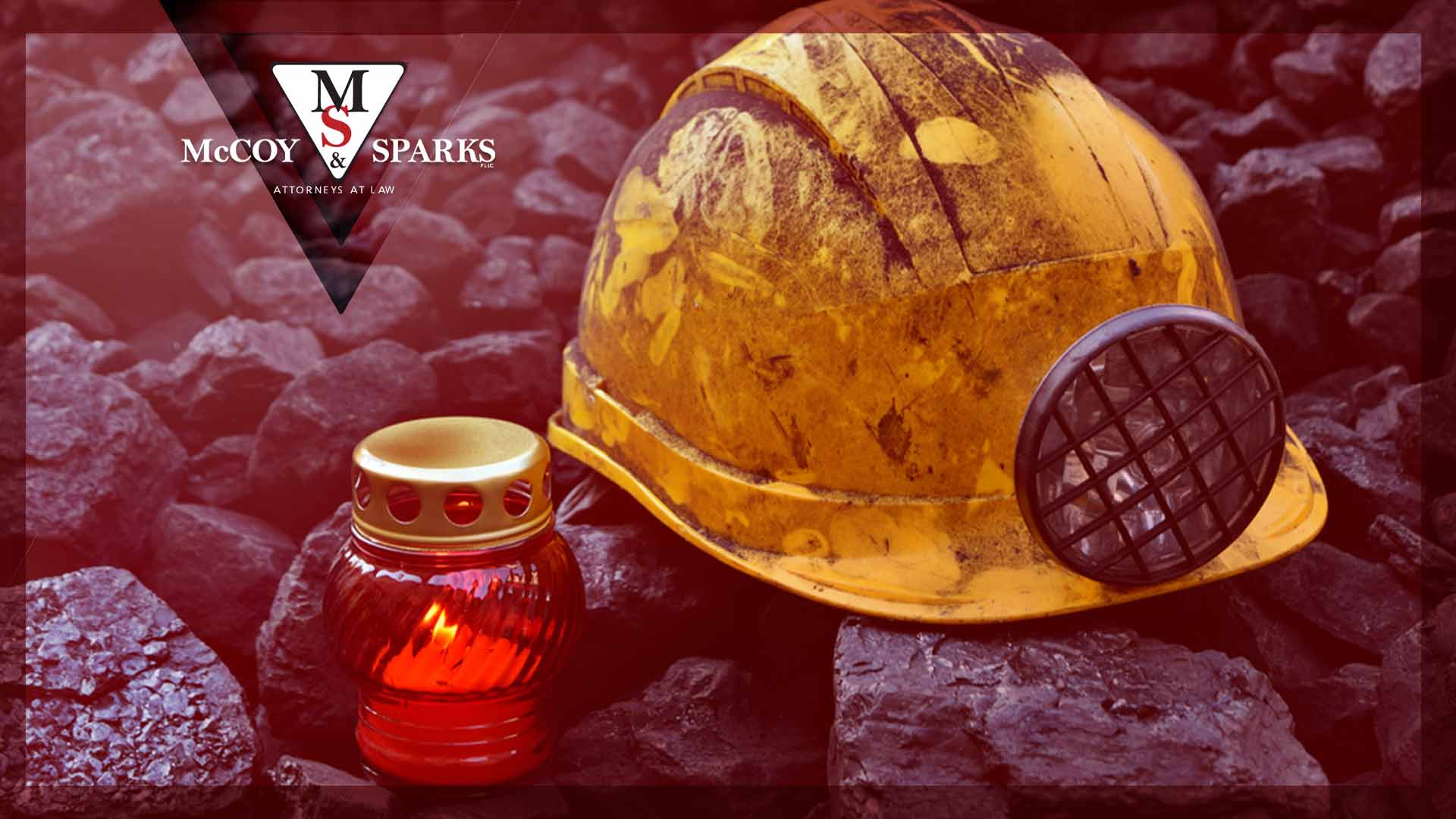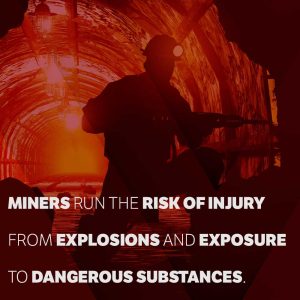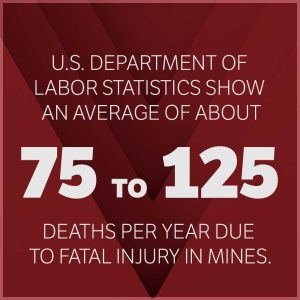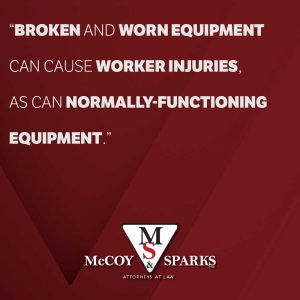
Secure the Compensation You Deserve After an Accident in the Mining Industry
The mining industry has some of the highest injury and fatality rates of any industry in the world. Across the U.S., the fatal injury rate is 14 out of 100,000 mining workers according to U.S. Department of Labor Statistics. Thousands of miners also experience severe but non life threatening injuries from catastrophic accidents.
Injury rates are the highest in regions with large numbers of mining workers, like Kentucky, West Virginia, Illinois, and Pennsylvania. In West Virginia, for example, the coal mining industry had more than 500 non-fatal accidents in one year plus two fatalities.
If you’re injured on the job in the mining industry, you may be entitled to valuable compensation for your injuries, missed work hours, and more. Workers’ compensation benefits can cover your medical treatment and lost time so you can focus on recovering and stop worrying about your bills.
McCoy & Sparks can help you understand the complex process of claiming mining injury benefits. Securing the full amount you’re owed isn’t always easy, so it helps to have our insights and expertise on your side.
We’ve helped countless injured mining industry workers who have been injured in devastating mining accidents. We understand the ins and outs of the complex laws governing your rights and responsibilities during this challenging time in your life.
This page answers common questions about mining industry injuries and explains what will happen next. We’ll educate you about how an attorney can be a huge help in claiming the full value of the benefits you deserve.
What Are the Most Common Injuries in Mining?

Mining comes with a wide variety of risks. Some are similar to any job, like strains and falls. Others are more specific to the mining industry, like explosions and exposure to dangerous substances.
A handful of mining accidents involve fatal injuries and the vast majority are not fatal injuries but are severe enough to prevent people from doing their jobs and living their lives as they used to. For every mining fatality in a fatal accident, there are thousands more mining injuries in non-fatal mine incidents.
Common Mining Injuries
- Loading-related injuries, like strains and sprains
- Crushing injuries from machines and heavy materials
- Injuries from being snagged by or caught in equipment
- Injuries from being trapped under falling materials
- Hand tool injuries from shovels, scrapers, wedges, and similar tools
- Slip-and-fall injuries
- Falling injuries from heights
- Burn and explosion injuries
- Inhalation injuries from hazardous fumes
- Drowning injuries and deaths from floods
- Repetitive motion injuries
- Broken bones
- Lacerations and other wounds
- Back and spine injuries
- Traumatic brain injuries (TBIs)
- Emotional injuries and post-traumatic stress disorder (PTSD)
It’s not only fatal injuries that impact people’s lives. As you can see, there are many ways you can be significantly injured in coal mining. In the next section, we’ll present common scenarios where workers are injured or killed in severe mining accidents.
Examples of Mining Injury Accidents

You may have seen news stories about coal mining disasters in your area. U.S. Department of Labor statistics show an average of about 75 to 125 deaths per year due to fatal injury in mines.
Despite these labor statistics, fatal injuries are far less common than just experiencing a workplace injury. Other injuries like neck injuries, broken bones, fire and burn injuries, and head trauma occur every day.
Coal mining incidents range from severe catastrophes with wide-ranging environmental impacts to everyday situations that don’t involve fatal injuries, but leave people with significant physical and emotional damage.
Every mining injury is unique, but many of these accidents tend to fall into certain categories. McCoy & Sparks watches these labor statistics to see the types of accidents happening to people in our area.
Here are some of the most common mine accidents in Kentucky, West Virginia, and other areas with mining operations.
Hauling Injuries
Moving heavy loads is a daily duty in coal mining. When loads shift or fall during transport, workers nearby are at risk of severe injuries to their hands, heads, necks, spines, and more.
Slip and Fall Incidents
Many mining incidents have involved slippery surfaces and substances like piles of loose materials, areas coated with thick layers of dust, and debris caked into work boots. Slip-and-falls are a constant risk.
Flooding
As they work underground, miners are exposed to the risk of sudden floods from water or liquid substances. When poor drainage is involved, sudden disasters can cause workers to drown or suffer severe injuries.
Fires and Explosions
Explosions are all too common in coal mining and can quickly cause injuries or death due to asphyxiation, smoke inhalation, or body-wide burns. Blunt force trauma is also a risk in mining explosions, which send debris flying in all directions. Even planned explosions can hurt or kill mining workers.
Machinery and Equipment Failures

Broken and worn equipment can cause worker injuries, as can normally-functioning equipment. This includes any injury on a vehicle or while operating a machine or equipment.
Mining companies sometimes fail to have safe procedures in place to prevent equipment-related injuries, including fatal injuries where the worker is crushed in a machine or under a vehicle. A supply cart or vehicle is an integral part of moving coal and other materials through a mine.
Vehicle involved injuries are more common in mines than people realize. A miner often relies on a vehicle to move them out of a risky area to avoid falling debris and other hazards.
Tool-Related Injuries
Mining workers use many types of hand tools that put their hands, arms, and eyes at risk of injury. An accident with a tool isn’t always the worker’s fault and may be related to poor maintenance or being given the wrong tools for the job.
Toxic Inhalation
Toxic inhalation involves breathing in dangerous gas, either all at once or over a period of time. You may be exposed to a gas like methane, nitrogen, hydrogen, hydrocarbons, or many other fumes that can harm your health.
Mine Roof and Structure Collapses
Collapses are mostly preventable in mining with the right safety precautions in place. However, miners still suffer collapse injuries from falling material, mine roof collapses, planned explosions, and more.
Repetitive Motion
While repetitive motion injuries are generally considered less serious than other injuries, they can ruin a miner’s career and livelihood. For example, neck injuries can make it impossible to operate machinery and work in a mine. Take repetitive stress injuries just as seriously as other types of injuries.
Who Investigates Mine Accidents?
The Mine Safety and Health Administration (MSHA) investigates mine accidents, including coal mining injuries, mining fatalities, and other non-fatal and fatal occupational injuries related to the mining industry. Their purview covers metal and nonmetal mining for any underground mine in the public domain or private industry.
The MSHA and the Occupational Safety and Health Administration (OSHA) track non-fatal and fatal mining injuries to calculate risks, maintain health statistics, conduct safety research, and educate the public. Occupational safety is the focus of many government organizations. Still, people inside and outside mining often fail to realize the high risk of fatal injury and non-fatal harm.
In the Upper Big Branch Mine disaster, 29 out of 31 workers were fatally injured at a mining site in West Virginia. Just three workers avoided death in this horrific underground coal dust explosion. The Mine Safety and Health Administration later determined that flagrant safety violations were the underlying cause of the disaster.
Many mining accidents never make the news, even when they wreck people’s lives and livelihoods. A miner who is injured in the line of work often suffers without acknowledgment in an industry where the risk of accidents is considered part of the job.
This is one of the major reasons why a miner needs legal representation after an injury. Their employers or even government agencies may take a blase attitude until they realize the miner knows their rights and has an experienced lawyer on their side.
Who is Responsible for Overseeing the Mining Industry?
Mining companies are in charge of mine safety and health and are often held responsible for mining accidents. This is true whether they are government contractors or part of the large private industry of mining enterprises.
While the Mine Safety and Health Administration oversees mines, they are not the liable party in mining accident claims. If you were injured, you’ll need to work with your employers to file a workers’ compensation claim. Non-employees who are injured in mining accidents usually have to start lawsuits or pursue settlements with private industry mining companies.
In Kentucky, the law requires notification to the Division of Mine Safety (DMS) within 10 business days or immediately for incidents involving death, injury, explosions, gas, fire, roof collapse, coal outbursts, or equipment damage.
West Virginia has similar reporting laws. The employer of an injured miner in West Virginia is expected to file a mine accident injury report within 10 days. Contact an attorney in the relevant area to determine your reporting requirements.
What’s the Difference Between a Continuous Miner and a Long Wall Miner?
A continuous miner physically cuts and loads coal onto transport vehicles, which are known as supply cars or shuttle cars. By contrast to a continuous miner, a long wall miner uses a longwall shearer to do the job and move sheared coal onto a conveyor.
Any miner can be fatally injured during their work because the equipment pulls and moves coal in a way that exposes the human body to the risk of injury. The risk of fatal injury to these workers was, in part, the inspiration for the Mine Act of 1977, which amended the Coal Act of 1969 to consolidate labor and safety statutes in the name of protecting every miner from workplace injuries.
Before these regulations, many miners had been involved in horrific workplace accidents and the industry saw hundreds of deaths due to gas explosion, mine roof collapses, and miners becoming trapped in enclosed spaces. Some say this period had the highest number of deaths ever in mining.
When multiple mining rules came together in the Mine Act of 1977, it was easier to track mining industry accidents and protect coal miners from injury. However, thousands of miners have still experienced harm or death in mines.
What Should I Do First After My Mining Industry Injury?
After your coal mining injury, act fast to seek emergency assistance for yourself and anyone else who is injured. Make safety and health a priority.
Provide first aid as you are able or call 911 to report injuries and request emergency aid. If someone is fatally injured in the coal mine, leave their body in place for accident investigators.
Notify your employer immediately and ensure you tell a supervisor about what happened, not just a co-worker. Request a written report about your injuries and keep a copy of it.
If possible, start taking photos and videos of the location of the incident, including your injuries. For miners, this is often the only chance to capture what happened in photos and videos. Keep copies of any written communications, like emails and texts from your employer.
See a medical provider as soon as possible to document your injuries and get medical care. Tell them about all of your concerns and health complaints related to the accident. If your doctor says you can’t work or puts you on light duty, notify your employer and save a copy of the order.
What is Workers’ Compensation for a Coal Mining Accident?
Just like other employers, mining companies are required to take measures to protect coal miners from occupational injuries, including following safety and health rules. When someone is severely or fatally injured in the course of mining work, mining companies are expected to help their workers recover through workers’ compensation.
Workers’ compensation is a no-fault benefit provided through the employer’s insurance company that covers injured workers’ costs and helps get them back to the fullest health possible. It is usually calculated to cover medical treatment for coal miners with a workplace-related injury and wage replacement with disability benefits.
The “no-fault” means it doesn’t matter who was at fault for the accident. Neither the employer nor the employee needs to admit fault, but the workers’ compensation is likely your exclusive remedy for your accident and you won’t be able to sue later.
If you have questions about what workers’ comp is and how it might work in your specific case, discuss them with your lawyer.
Will My Coal Mining Accident Be Covered With Workers’ Compensation Benefits?
Generally speaking, workers’ compensation benefits will cover most injuries and illnesses occurring as a result of your work in coal mining, even if your injury happened while on a paid break or while traveling for work. Coal mining fatal occupational injuries are also compensable to family members.
To qualify, your injury or illness must be related to working your coal mining role and can’t happen while off the job. This is why filling out an incident report immediately is so important.
When you don’t have fatal mining injuries, you’ll need to show that the damage is work-related and, if you’re claiming disability benefits, that it is limiting your ability to do your job.
Your compensation will be based on the cost of your injuries, your hours worked, and other factors. Long-term or permanent disability may involve calculating your lost earning capacity, considering your total mining experience, education, training, and more.
How are Fatal Injuries Handled in the Coal Mining Industry?
In the coal mining industry, fatal injuries are unfortunately fairly common. Fatal coal mining injuries are devastating for the families of the deceased. Their lives have changed forever since the fatal accident occurred.
If someone has fatal injuries and is killed in a mining accident, the employer is required to report it to the relevant authorities mentioned above. Fatal mining injuries are tracked in government statistics, even if these fatal injuries happen in a private industry coal company.
When someone loses a loved one to a fatal injury in a mine, they can apply for compensation from the coal company and its insurance provider. Fatal injuries usually bring high levels of compensation because death is permanent and traumatic for the family.
For more information about seeking death benefits for a loved one who suffered fatal injuries in a mining accident, speak to a personal injury lawyer with experience in wrongful death, workers’ comp, and death benefit claims.
Miner Tips: How to File a Kentucky Workers’ Compensation Claim
In Kentucky, workers’ comp claims are handled by the Kentucky Department of Workers’ Claims (DWC). In West Virginia, these claims go through the West Virginia Offices of the Insurance Commissioner. In other states, similar agencies handle such claims.
To start your claim for an accident while working as a miner, provide notice to your employer immediately after the accident and seek medical treatment. Get an incident report and ensure your employer files the claim. You can also work with a lawyer to file the claim yourself.
Discuss your claim with a lawyer before making any agreement with your employer or their insurance company. Your lawyer will help you ensure your benefits are paid according to the full amount you’re due, including your lost wages and more.
Navigating a workers’ compensation claim can be tricky for a miner. Mining companies don’t always want to pay the full salary workers are due. They may avoid paying out for lost wages, medical bills, or even costs related to someone who was fatally injured in their mine.
Your employer may want to conceal death or injury from federal scrutiny and won’t want to be held responsible. If a miner was hurt or killed at their site, a mining company might hope to avoid notifying state and federal authorities. This puts you in a difficult situation.
In most cases, it is best to work with an attorney who has experience with workers’ comp law and will know how to handle the company, its insurance provider, and your medical costs. Your lawyer understands labor laws and can help you file your claim and defend your rights as an injured coal miner.
What if My Mining Workers’ Compensation Claim Gets Denied?
If you’re a miner who is worried about your mining accident claim being denied, act quickly to prevent errors and omissions that could interfere with a successful claim.
Below are the most common reasons for denials:
- There was no timely notice to the employer about the injury.
- The miner had non-work-related injuries.
- The injuries were too minor for benefits.
- There were false or inaccurate statements about what happened.
- The injured person had pre-existing conditions.
- An illness in the claim was not related to the job.
- There was a failure to seek prompt medical care.
- Intoxication was involved in the incident.
- There was a willful intent to do harm on behalf of the injured person.
- The injured person failed to follow a doctor’s orders.
- The injury occurred during an off-the-clock period or an unpaid break.
- It was impossible to determine how someone was fatally injured.
- The employer is disputing your claim.
- Someone made simple mistakes in filling out the forms.
As you progress with your claim, keep in mind that a denied claim isn’t always the final word. Speak to your lawyer about a mistake that needs correction or a defense to a denied claim.
You may be able to claim benefits after your lawyer helps you secure them from the insurance company, despite the initial denial. An insurance company sometimes denies a claim at first but approves it later.
For example, you may be able to prove that your illness is job-related, despite their claim that it was not. Your lawyer can use research to show your illness is related to known risks in coal mines.
If your claim was denied due to intoxication, violence, or lying, these factors may be very difficult to overcome. Some denials won’t be won on appeal, so check with your lawyer to determine your chances of a successful claim.
How Will McCoy & Sparks Help Me With My Mining Injury Claim?
A workers’ comp lawyer guides their client through the process and ensures all information is complete, accurate, and on time. When you have an issue like a denied claim or reduction in benefits, your lawyer steps in to educate you about what’s happening and pursue a more positive outcome.
How McCoy & Sparks Helps a Miner
- We’ll handle communications with the mining company and insurance company
- As needed, we’ll notify federal, state, and other agencies.
- You’ll have the assistance you need to gather your medical records and build a case.
- When necessary, we’ll use trained staff to communicate the extent of your injuries.
- We’ll work to maximize your workers’ comp benefits.
- We’ll help you resolve issues that arise and allow you to focus on your recovery.
As a miner, you have the right to hire a lawyer to help you with your accident claim. You may find that it’s much easier to secure the benefits you deserve when you have a lawyer working to help you. Miners have more options when they have the right representation.
Free Consultation With McCoy & Sparks: In Your Town and On Your Team
We’ll offer you a free consultation about your mining accident to understand your situation and help you see your next best steps. If you were severely injured or acquired an illness due to poor mine safety and health standards, you may have a strong case for maximum compensation.
Facts About McCoy & Sparks
McCoy & Sparks is located in Bardstown, Kentucky, and represents people injured in mining.
We have extensive experience handling mining workers’ compensation cases and many other types of cases.
You’ll be glad to know that we have recovered millions of dollars for clients injured in work-related incidents in mines and other settings.
We genuinely care about our clients and make it our mission to deliver superior results. You’ll see satisfied testimonials on Facebook, Google Reviews, and plenty of other review sites.
If you were injured in a mining accident, please contact McCoy & Sparks for your free and confidential consultation. We’ll ask questions about your job as a miner and the situation that led to your mining injury, using our legal expertise to help you understand what to do next.
Your safety and health are our priority and you can trust us with your mining injury compensation case. We work tirelessly to make sure every injured miner has the best possible chance at a positive outcome.
NO FEE UNLESS YOU WIN. Call 1-844-4KY-WINS.

